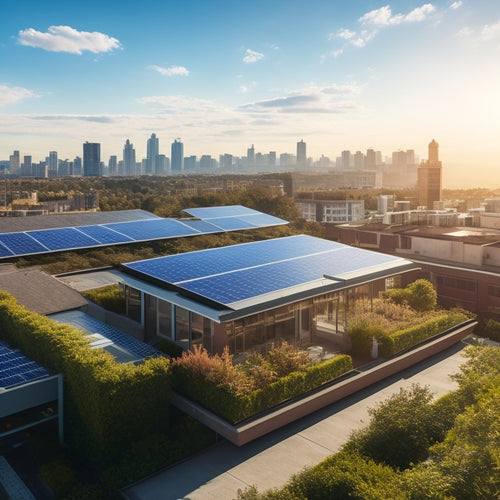
What Are the Environmental Benefits of Home Solar Units?
Share
As you consider home solar units, you'll want to know about their environmental benefits. By installing one, you'll reduce greenhouse gas emissions, equivalent to planting 100-150 trees, and lower your carbon footprint. You'll also eliminate air pollution emissions, conserve water resources, and decrease reliance on fossil fuels. Plus, solar energy generates electricity without hazardous waste or emissions, and its long lifespan reduces electronic waste generation. You'll be supporting ecosystem health, biodiversity, and mitigating climate change effects. And, as you investigate this option further, you'll uncover even more ways you can contribute to a cleaner, more sustainable environment.
Key Takeaways
- Home solar units reduce greenhouse gas emissions by 3-4 tons annually, equivalent to planting 100-150 trees or not driving 20,000-30,000 miles.
- Solar power eliminates air pollution emissions from home energy use, improving local air quality and contributing to a healthier community.
- Solar energy requires minimal water for operation, conserving water resources and supporting sustainable gardening and landscaping practices.
- Home solar units decrease reliance on non-renewable energy sources, promoting energy efficiency awareness and optimization of consumption.
- Solar panels generate clean energy without hazardous waste or emissions, preventing soil and water contamination and supporting a sustainable future.
Reducing Carbon Footprint
As you flip the switch to employ the power of solar energy, you're taking a significant step towards reducing your carbon footprint.
By capturing the sun's energy, you're decreasing your reliance on fossil fuels and the greenhouse gas emissions they produce. This reduction in emissions contributes to a cleaner environment and helps combat climate change.
In addition to the environmental benefits, you'll also experience energy independence and financial savings.
Solar panels allow you to generate your own electricity, reducing your dependence on the grid and shielding you from rising energy costs.
With a solar-powered home, you can lock in a fixed energy rate for years to come, protecting your wallet from inflation and rate hikes.
Zero Air Pollution Emissions
Leverage the power of solar energy and simultaneously eliminate air pollution emissions from your home. By switching to a home solar unit, you're not only reducing your reliance on fossil fuels but also improving local air quality.
Renewable technology like solar power generates electricity without burning fossil fuels, which means zero air pollution emissions. This is especially significant in urban areas where air quality is often compromised by industrial and vehicular emissions.
As you capture the sun's energy, you're contributing to a cleaner environment and a healthier community. Air pollution is a serious concern, and by choosing solar power, you're doing your part to mitigate its effects.
Imagine breathing easier, knowing that your home is powered by a clean and sustainable source of energy. With solar power, you're not only reducing your carbon footprint but also enjoying the benefits of improved air quality.
Conservation of Water Resources
By utilizing solar energy, you're not only reducing your carbon footprint but also conserving water resources. This is particularly important, as traditional energy sources often rely on water-intensive cooling systems.
In contrast, solar energy requires almost no water to operate.
Here are 4 ways you can further conserve water resources with home solar units:
-
Rainwater Harvesting: Collect and store rainwater for non-potable uses, such as watering plants or washing cars, reducing the demand on municipal water supplies.
-
Implement Sustainable Gardening and Eco-Friendly Landscaping practices, like using native plantings and soil conservation techniques, to minimize water waste and reduce stormwater runoff.
-
Incorporate Green Roofs and Permaculture Practices to maximize water retention and reduce the burden on aquifer recharge.
- Install Water Efficient Appliances to minimize indoor water consumption, further reducing your water footprint.
Lower Dependence on Fossil Fuels
Freedom from fossil fuels is a crucial step towards a sustainable future, and home solar units are leading the charge. By installing solar panels, you're reducing your reliance on non-renewable energy sources and decreasing your carbon footprint.
With solar panel efficiency increasing rapidly, you can generate more power while reducing your energy costs. Additionally, renewable energy incentives make it more affordable to switch to solar.
Energy independence benefits are substantial, as you're no longer at the mercy of fluctuating energy prices. This stability enhances grid stability, allowing utilities to better manage energy distribution.
Your home value increases, as solar installations become a sought-after feature for environmentally conscious buyers. Local job creation also receives a lift, as the solar industry continues to grow.
Battery storage advantages enable you to store excess energy for later use, further reducing your dependence on the grid. Community solar programs allow you to share the benefits with your neighbors.
With technology advancements making solar more accessible and affordable, there's never been a better time to join the renewable energy revolution.
Minimizing Waste and Landfill
Solar panels generate clean energy, producing no hazardous waste or emissions during operation, making them an attractive alternative to traditional power sources.
As you consider switching to solar power, you'll not only reduce your carbon footprint but also minimize waste and landfill contributions.
By choosing solar energy, you'll experience significant waste reduction benefits, including:
-
Zero hazardous waste generation: Solar panels produce no toxic chemicals or heavy metals that can contaminate soil and water.
-
Minimal packaging waste: Solar panel packaging is designed to be recyclable, reducing waste sent to landfills.
-
Reduced electronic waste: Solar panels have a long lifespan, reducing the need for frequent replacements and electronic waste disposal.
- Landfill diversion: Solar panels can be recycled at the end of their life, diverting waste from landfills and conserving natural resources.
Reducing Greenhouse Gas Emissions
By installing a home solar unit, you're switching to a clean energy source that greatly reduces your reliance on fossil fuels.
This, in turn, lowers your carbon footprint, contributing less to the greenhouse gas emissions that contribute to climate change.
As a result, you'll be producing greatly fewer emissions than traditional energy sources, helping to mitigate the negative impacts on the environment.
Clean Energy Source
Nearly 65% of the electricity generated in the United States comes from fossil fuels, which are the largest contributor to greenhouse gas emissions.
By installing a home solar unit, you're choosing a clean energy source that reduces your reliance on fossil fuels. This shift towards solar technology not only benefits the environment but also grants you energy independence.
Here are four key benefits of solar energy as a clean energy source:
-
Zero Emissions: Solar energy generates electricity without emitting any greenhouse gases or pollutants, making it an environmentally friendly option.
-
Renewable Resource: Solar energy is a renewable resource, meaning it's sustainable and won't run out.
-
Low Maintenance: Solar panels require minimal maintenance and can last up to 30 years or more.
- Energy Self-Sufficiency: With solar energy, you're generating your own electricity, reducing your reliance on the grid and increasing your energy independence.
Lower Carbon Footprint
How much of a difference can you make in reducing greenhouse gas emissions by switching to a home solar unit? You'll be surprised at the significant impact you can have.
Solar power generation is a zero-emission source of energy, which means it produces no greenhouse gases or pollutants that contribute to climate change. By capturing the sun's energy, you'll reduce your reliance on fossil fuels and lower your carbon footprint.
The amount of emissions you'll reduce depends on your energy usage and the solar panel efficiency of your system. On average, a typical residential solar panel system can reduce CO2 emissions by 3-4 tons per year.
That's equivalent to planting over 100 trees or taking two cars off the road for a year. Furthermore, with renewable energy incentives, such as tax credits and rebates, installing a home solar unit is more affordable than ever.
Protecting Biodiversity and Ecosystems
What role can renewable energy sources, such as home solar units, play in preserving the delicate balance of ecosystems and biodiversity? By shifting to clean energy, you're not only reducing your carbon footprint but also supporting the health of ecosystems.
Here are 4 ways home solar units contribute to biodiversity and ecosystem preservation:
-
Habitat Preservation: Solar panels can be designed to accommodate local wildlife, preserving natural habitats and ecosystems.
-
Ecosystem Stability: Renewable energy reduces the need for fossil fuels, decreasing pollution and promoting a healthier environment.
-
Wildlife Protection: Sustainable landscaping around solar installations can provide a safe haven for pollinators and other wildlife, enhancing biodiversity.
- Natural Resource Conservation: By reducing energy consumption from non-renewable sources, you're conserving natural resources and promoting ecological balance.
Mitigating Climate Change Effects
By installing a home solar unit, you're taking a significant step in reducing your carbon footprint and slowing down climate change.
You'll lower your greenhouse gas output, which contributes to global warming, and shift to a clean energy alternative that produces no emissions.
As a result, you'll be doing your part to mitigate the devastating effects of climate change, such as rising sea levels and intense weather patterns.
Reduce Carbon Emissions Fast
You're likely aware that climate change is one of the most pressing issues of our time, and reducing carbon emissions is critical to mitigating its effects.
One of the most effective ways to do this is by installing a home solar unit. By utilizing the power of solar technology, you can markedly reduce your reliance on fossil fuels and decrease your carbon footprint.
Here are 4 key benefits of solar energy in reducing carbon emissions:
-
Immediate Impact: Solar energy produces zero emissions during operation, making it a clean source of power that can immediately reduce your carbon output.
-
Energy Independence: By generating your own energy, you're no longer reliant on the grid, which is often powered by fossil fuels. This means you're in control of your energy consumption and production.
-
Reduced Energy Consumption: Solar panels encourage energy efficiency, as you're more aware of your energy usage and can optimize it to match your solar production.
- Long-term Sustainability: Solar technology is a long-term solution, providing clean energy for decades to come, and reducing your carbon emissions for years to come.
Lower Greenhouse Gas Output
Four decades of unchecked greenhouse gas emissions have led to a precarious tipping point in the Earth's climate system. You're likely aware of the devastating consequences of climate change, from intense natural disasters to unpredictable weather patterns. Fortunately, installing a home solar unit can greatly lower your greenhouse gas output.
By utilizing renewable energy from the sun, you'll reduce your reliance on fossil fuels and decrease your carbon footprint. According to the National Renewable Energy Laboratory, a typical residential solar panel system can eliminate 3-4 tons of carbon emissions annually. That's equivalent to:
| Emissions Reduction | Equivalent Action |
|---|---|
| 3-4 tons of CO2 | Planting 100-150 trees |
| 2,000-3,000 pounds of CO | Not driving 20,000-30,000 miles |
| 1-2 tons of SO2 | Reducing 10-20 tons of waste |
What's more, you can benefit from renewable energy incentives, such as tax credits and rebates, which can offset the initial cost of your solar panel system. With advancements in solar panel efficiency, it's now more feasible than ever to shift to clean energy and mitigate the effects of climate change.
Clean Energy Alternative
Solar energy presents a viable clean energy alternative to mitigate the devastating effects of climate change. As you consider switching to solar power, you'll not only reduce your carbon footprint but also contribute to a cleaner, healthier environment.
By utilizing renewable resources, you'll decrease your reliance on fossil fuels and lower your energy bills.
Here are four benefits of adopting solar technology for a clean energy alternative:
-
Energy Independence: Solar power allows you to generate your own energy, reducing your reliance on the grid and providing a sense of energy independence.
-
Financial Incentives: Governments offer various financial incentives, such as tax credits and rebates, to encourage the adoption of solar technology.
-
Streamlined Installation Process: The installation process has become more efficient, making it easier for you to shift to solar power.
- Grid Integration and Energy Storage: Advancements in grid integration and energy storage have made it possible to store excess energy generated during the day for use during the night or on cloudy days.
Supporting Sustainable Development
One of the most significant advantages of home solar units is their role in supporting sustainable development. By utilizing renewable energy, you're contributing to a cleaner, more sustainable future.
Home solar units promote sustainable infrastructure, reducing our reliance on finite resources and mitigating the environmental impact of traditional energy sources. This, in turn, helps guarantee energy equity, making clean energy accessible to everyone, regardless of socioeconomic status or geographical location.
As you generate your own clean energy, you're reducing your carbon footprint and dependence on the grid. This not only benefits the environment but also strengthens energy security and reduces the burden on the grid during peak hours.
Frequently Asked Questions
How Long Does It Take for Solar Panels to Pay for Themselves?
You'll typically break even on your solar investment in 5-7 years, depending on energy savings and local incentives, after which you'll enjoy free electricity and a significant return on investment.
Can I Install Solar Panels on a Rented Property?
You're probably thinking, "I'm renting, not buying," but you can still utilize solar power! Investigate solar panel options that work with tenant agreements, allowing you to negotiate with your landlord and reap the benefits of renewable energy.
Do Solar Panels Work During Power Outages?
You'll find that solar panels don't provide power during outages unless you have a battery backup system, which stores excess energy generated during the day for later use, ensuring maximum solar panel efficiency and reliable energy storage.
Are Solar Panels Damaged by Hail or Heavy Rain?
You're wondering if solar panels can withstand harsh weather conditions. The good news is that most solar panels are designed to be durable and resistant to hail damage, with some models tested to withstand hail up to 1 inch in diameter.
Can I Sell Excess Energy Back to the Grid?
You can sell excess energy back to the grid through net metering policies, which measure your production and consumption, or energy buyback programs, where utilities purchase your surplus energy, offsetting your bills and increasing your energy independence.
Related Posts
-

10 Tips to Buy Affordable Solar Panels Online
When purchasing affordable solar panels online, you'll want to research reputable retailers, compare prices, and chec...
-

10 Tips for Cleaner City Air With Scooters
By adopting a few simple habits, you can make a significant impact on reducing city air pollution with your scooter. ...
-

What Is the Cost to Put in Solar Panels
You're likely considering solar panels for your home, and the most significant factor in your decision is the upfront...


